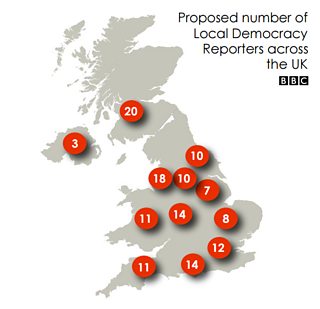Local journalism partnership: BBC and local news partners move forward
Matthew Barraclough
Head of BBC Local News Partnerships
After months of work, we finally have in place a detailed plan for a new partnership with the local news sector for this Charter period.
Every part of the sector has been involved in developing these plans: from the main press publishers represented by the NMA, to the news agencies, commercial television and radio, hyperlocals and local television. I believe what we’ve agreed will extend the reach of BBC journalism, will help support local news generally and build a better understanding of local democracy. Now the priority is to turn these plans into reality.
We’ve agreed the criteria by which we will decide who qualifies as a potential partner. The principle is simple – if we feel a local news service (of any size or type) makes quality public service journalism , then they should be able to get access to relevant BBC audio and video via the NewsBank, access stories from their local councils from the Local Democracy Reporting Service (LDRS) and also content from our Shared Data Hub. Download the full criteria from the Inside the BBC website.
We hope to get the Shared Data Hub in action very soon. Based in Birmingham, BBC staff will work alongside seconded journalists from industry to produce data-driven content specifically for the local news sector.

Proposed number of Local Democracy Reporters across the UK
The next most likely development will be roll-out of the LDRS. The Service will be funded by us, but the staff won’t be BBC employees. It will be a network of reporters employed by other news organisations, who will report on local authorities, filing their copy and additional multimedia into a central system which will then be distributed simultaneously to all local partners.
The BBC will advertise and award contracts to run these reporters and in order to make the process manageable, the reporters have been “bundled” together. The bundles range from a single reporter, to as many as six. To ensure coverage of the whole country, we have allocated them according to top-tier local authority area (although their remit will allow them to include relevant districts, quangos and other unelected local authorities). Alongside the agreed criteria we have provided an incentive for larger providers to partner with smaller organisations, encouraging the widest possible participation.
The final piece of the jigsaw will be NewsBank. It’s a simple idea – to share with other local news providers BBC audio and video to help illustrate their online journalism – but complex in the execution. We’re currently in the early stages of investigating whether external providers can help us with delivery, but we’d hope to see a video-only version online between late summer and autumn this year.
I’ll keep you updated here as we progress.
Matthew Barraclough, Editor BBC Journalism Working Group
